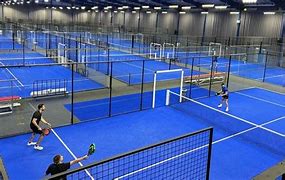

The Rise of Padel Ball Court Factories
In recent years, padel has surged in popularity, becoming one of the fastest-growing sports globally. Originating in Mexico, the sport combines elements of tennis and squash and is played in an enclosed court. As the demand for padel courts rises, so too does the need for specialized manufacturers to produce high-quality padel ball courts. This article explores the emergence of padel ball court factories, their significance, and what sets them apart in the sporting goods industry.
The Padel Phenomenon
Padel's appeal lies in its accessibility and social nature. Unlike some sports, which can be intimidating for newcomers, padel is often seen as easy to pick up. Most players find they can enjoy a game with minimal instruction, making it appealing for all age groups. This growing popularity has spurred a demand for more playing facilities, particularly in countries like Spain, Italy, and Scandinavia, where padel courts are popping up in various locations, including sports clubs, parks, and even private homes.
The Role of Padel Ball Court Factories
As the demand for padel courts grows, specialized factories have emerged to meet this need. Padel ball court factories not only construct the courts but also ensure they meet international standards set by the International Padel Federation (FIP). This involves utilizing specific materials, dimensions, and build techniques that enhance gameplay and safety.
1. Design and Engineering
Factories invest heavily in research and development to create courts that provide optimal playing conditions. They must consider factors such as court surface material, lighting, and ventilation. The surfaces can vary from artificial grass to cement, each offering different playing experiences. Courts are also built with secure fencing to prevent balls from leaving the playing area, enhancing the game’s flow.
2. Material Selection
The materials used in constructing a padel court are critical for ensuring durability and performance. Padel court manufacturers utilize high-quality glass for walls, which not only allows for visibility but also adds to the court's aesthetic appeal. Moreover, the choice of paint, coatings, and flooring materials impacts player safety, performance, and maintenance needs.

3. Customization
One of the primary advantages of specialized padel ball court factories is their ability to provide customized solutions. With the growing interest in padel, many enthusiasts are looking for personalized courts that fit their unique preferences and space constraints. Factories often offer bespoke design options that allow customers to choose size, color, and layout, ensuring that each court meets the client’s specifications.
Economic Impact
The emergence of padel ball court factories represents a significant economic opportunity. As more enthusiasts take up the sport, local economies benefit from increased demand for equipment, coaching, and facilities. Furthermore, companies specializing in padel courts are creating jobs in manufacturing, installation, and maintenance. This development also encourages tourism in areas with well-known padel ecosystems, as players often travel to participate in tournaments or to experience renowned courts.
Environmental Considerations
As with any manufacturing sector, environmental consciousness is becoming increasingly important. Many padel ball court factories are adopting sustainable practices, such as using recycled materials for surfaces and utilizing environmentally friendly coatings. Additionally, some factories are exploring renewable energy options to power their operations, reflecting a broader industry shift towards sustainability.
The Future of Padel Ball Court Factories
The future of padel ball court factories looks bright, driven by continuous growth in the sport's popularity. As more people recognize the benefits of padel, from fitness to social interaction, the demand for new and innovative court designs will only increase. These factories will play a pivotal role in shaping the future landscape of padel, ensuring that courts are not just functional but also aesthetically pleasing and environmentally sustainable.
In conclusion, padel ball court factories are at the forefront of an exciting movement in the sports industry. Their specialized knowledge, commitment to quality, and ability to innovate will continue to support the growth of padel as a mainstream sport. As we look to the future, these manufacturers will undoubtedly be key players in promoting padel's enduring appeal worldwide.
Homogeneous Transparent Floor Durable & Stylish Rubber Floor Solutions
Premium Rubber Composite Floor for Ultimate Durability & Safety Rubber Floor Mat Solutions
High-Quality Industrial Flooring Solutions for Factories Expert Installation & Cost Saving
Premium Rubber Brick Flooring Durable & Slip-Resistant
Durable & Non-Slip Rubber Flooring for Gym, Garage, Home
Durable Industrial Flooring Solutions China Padel Install